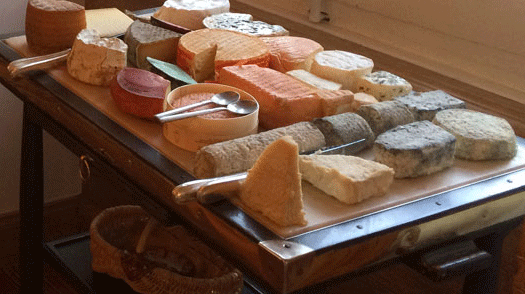You would imagine that a country with more than 400 different cheeses would have a certain number of expressions involving the word fromage, but surprisingly, there are more cheesy expressions in English than in French.
I was rather disappointed recently to learn that Il en fait tout un fromage only appeared in the 20th century. The explanation for its origin seems a little doubtful to me. Starting with nothing (a bit of milk), you can produce something as elaborate as a perfect camembert. Yet the expression in French is negative and corresponds to the English “to make a mountain out of a molehill” so I don’t really see the connection.
However, it set me thinking about other expressions involving cheese. J’ai trouvé un (bon) fromage means I found a cushy job which is sort of self-explanatory but not really.
On the English side, we have “say cheese” which obviously doesn’t work in French but dites cheese or even dites fromage for people in the know will bring about a smile or two. It is more common to say ouistiti which is a little monkey (a marmouset) and sometimes sexe!
To be cheesed off with something is less metaphorical in French. J’en ai marre is the most common expression you will hear, or simply j’en ai assez.
And what about “cheesy” as a derogatory term? Meaning cheap or inferior, it was first attested in 1896, perhaps originally U.S. student slang, along with cheese, meaning an ignorant, stupid person. In the late 19th century, in British slang, cheesy meant fine or showy (1858). The modern derogatory use may be an ironic reversal of this.
I used to have a translation student from Canada who was always coming up with amusing equivalents to French which she would qualify as “cheesy”. It’s translation into French varies enormously with the context. A cheesy song could be une chanson ringarde with the idea that it’s outdated. A cheesy grin = un large sourire. Perhaps a cheesy film might be un film de mauvais goût.
A big cheese in French is not a gros fromage but a gros bonnet. The French expression was developed in the 17th century in reference to the 4-cornered hat worn by doctors, ecclesiastics, judges and other VIPs of the time. So why “big cheese” in English? It comes from a British expression meaning the best or correct thing, the best, a corruption of the Persian or Urdu chiz (or cheez), meaning “thing” that the British brought back from India in about 1840.
I think it’s very amusing that a pie chart in statistics is a camembert in French. So very appropriate!
Did you ever go to a French wine and cheese party? We used to have them all the time in the French department at my university in Australia. They don’t exist in France of course. About the closest thing is a buffet campagnard but it includes pâtés and other cold cuts as well.
One last expression: fromage de tête is pork brawn of all things!
Do you know any other cheesy expressions?


I think you’ve covered the English ones I know of. Interesting to see the French variant for big cheese.
Yes, it’s rather good, isn’t it?
Maybe they take cheese seriously?
There are plenty of other food expressions, though!
Cheese and ouistiti have a long E sound in common–our mouths open horizontally for it, kind of like a smile.
You’re probably right!
Yes ouistiti, for the French, is a smiley word, prrobably less for an anglo-saxon.
I seem to remember hearing le grand légume for ‘the big cheese’ too. I’ve heard bifsteak from people smiling for a photo too.
That’s interesting – I’ve never heard “bifsteak” in that context nor “le grand légume” which is a surprising expression, considering that “un légume” is used for someone who is brain dead.
The bifsteak was from a French family I overheard at Villandry, clowning around and photographing each other. Le grand légume is from so long ago I could be misremembering it.
It shows the complexity (and fun!) of learning another language.
It is certainly complex – and definitely fun!
I’m not certain about more existing english expressions, but there are definitely more cheesy temrs in French!
For example, the French are happy when they eat cheese, but when they’re sad they’re rather “triste comme un plat sans fromage”!
Ah yes, “triste comme un plat sans fromage” is very indicative of French culture!